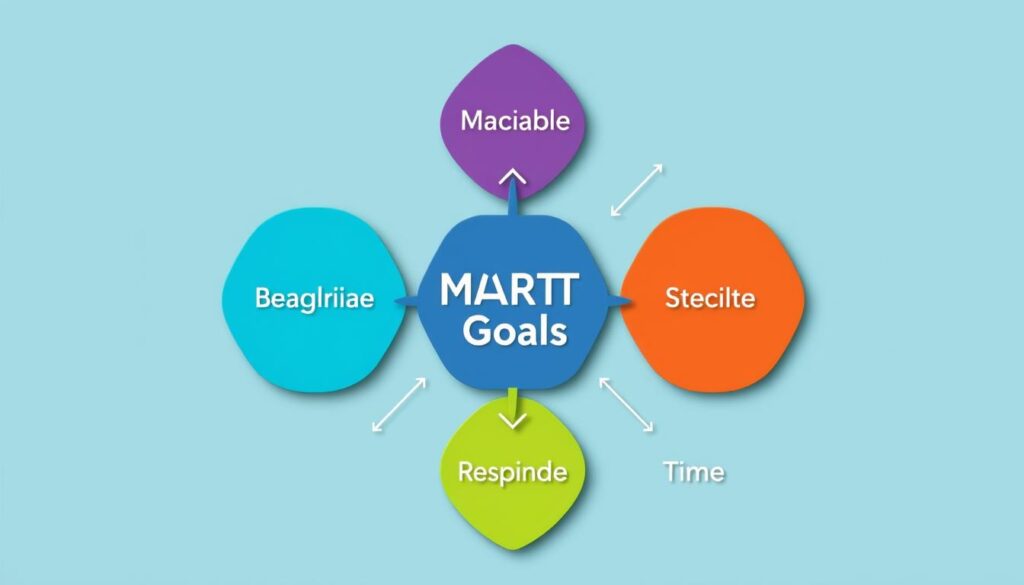As the calendar turns and a new year approaches, you stand at the threshold of transformative potential. The journey of goals for 2025 isn’t about making fleeting resolutions that fade by January’s end. It’s about crafting a strategic roadmap that propels you toward meaningful aspirations.
Imagine your life as a canvas waiting to be painted with intentional strokes of vision and targeted objectives. Unlike traditional New Year’s promises, these goals are carefully designed targets. They reflect your deepest desires for personal growth, professional advancement, and holistic success.
The power of goal setting lies not in grand declarations, but in specific, actionable plans. These plans transform dreams into tangible milestones. Your roadmap for 2025 will be a dynamic blueprint of your potential. It’s meticulously crafted to turn aspirations into achievements.
Table of Contents
Understanding the Importance of Goal Setting
Goal setting is a powerful tool for personal growth and shaping your 2025 life goals. It helps you unlock your potential to achieve remarkable things. The journey of personal growth starts with understanding how goals can reshape your future.
Your brain thrives on structure and direction. Goal-setting psychology shows that setting specific targets leads to success in personal and professional life.
Why Goals Matter for Personal Growth
Effective goals for 2025 offer several key benefits:
- Create a clear roadmap for personal development
- Enhance motivation and focus
- Build self-confidence through measurable achievements
- Provide a sense of purpose and direction
“Goals are the bridges between your current reality and your desired future.” – Scott Corvey
The Psychology Behind Successful Goal Setting
Understanding goal-setting psychology means recognizing that successful objectives follow specific patterns. SMART goals (Specific, Measurable, Achievable, Relevant, Time-bound) are crucial for turning aspirations into reality.
Building a Foundation for Achievement
To create a strong foundation for your 2025 goals, consider these strategies:
- Reflect on your core values
- Identify areas for personal growth
- Break larger goals into smaller, manageable steps
- Develop a consistent tracking system
Remember, your goals are personal blueprints for success. By understanding the psychology of goal setting, you can transform your aspirations into tangible achievements.
Goals For 2025: Creating Your Strategic Roadmap
Creating a strong plan for 2025 needs careful thought and a clear vision. Your journey begins by turning big dreams into real steps.
“Success is not an accident, but a deliberate strategy carefully designed and consistently executed.”
Setting goals is key to making your dreams come true. Here’s a detailed roadmap to guide you through 2025:
- Reflect on past achievements and challenges
- Identify key focus areas across different life domains
- Break down large goals into manageable steps
- Create realistic timelines
- Develop flexible action plans
The SMART goals technique is a great way to make your goals real. It makes sure your goals are:
- Specific: Clearly defined and precise
- Measurable: Trackable with concrete metrics
- Attainable: Realistic and within reach
- Relevant: Aligned with your core values
- Time-bound: Connected to specific deadlines
Think about grouping your goals by life areas like health, knowledge, career, relationships, and personal growth. This way, you grow in all areas, not just one.
Your 2025 plan should be flexible. Regularly check and adjust it to keep on track and ready for surprises.
Personal Development Goals and Self-Improvement
Starting your personal growth journey needs a clear plan. First, learn to set goals that change your life and help you reach your highest potential.
Research shows writing down goals boosts success by 42%. This fact highlights the power of planning your personal growth.
Mastering New Skills and Habits
Improving your skills is key to growing. Here are ways to grow your abilities:
- Learn a new language online
- Take online courses in your field
- Practice playing a musical instrument
- Get better at coding or digital marketing
“Growth is the only evidence of life.” – John Henry Newman
Time Management and Productivity Goals
Good time management boosts your productivity. Aim to build habits that help you work better.
| Productivity Technique | Expected Outcome |
|---|---|
| Pomodoro Technique | More focus and less burnout |
| Time Blocking | Better task completion |
| Morning Routine Optimization | Better daily performance |
Educational and Learning Objectives
Keeping up with learning is crucial for growth. Use the SMART goal method to set clear, achievable goals that motivate you.
- Sign up for a professional certification
- Read a non-fiction book every month
- Go to workshops in your field
- Learn a new digital skill every quarter
Remember, personal growth is a lifelong journey of learning and self-improvement. Stay dedicated, adapt, and celebrate your achievements.
Financial Planning and Wealth Building Targets
Creating strategic financial goals is your path to success in 2025. Almost 38% of Americans are focusing on financial stability first. This shows a big chance for building wealth. Your financial path begins with clear goals that change your money situation.
Setting strong financial goals can lessen stress and lead to lasting wealth. Here are some key strategies for your wealth goals:
- Create an emergency fund for 3-6 months of expenses
- Start saving regularly with automatic monthly payments
- Look into different investment options
- Work on paying off debts systematically
“Writing down your financial goals can increase achievement rates by up to 42%,” according to recent research.
Your investment plan should aim for diversity and steady growth. Tracking your net worth monthly helps you see how you’re doing. Think about using retirement plans like Roth 401(k)s, which help your money grow tax-free.
Here are some steps for 2025 financial goals:
- Check your subscriptions and cut what you don’t need
- Look over your insurance to make sure you’re covered
- Set a clear budget
- Make saving and investing automatic
Remember, good financial planning is about steady effort and smart planning. Celebrate your small wins to keep you motivated and moving toward your wealth goals.
Professional and Career Advancement Objectives
Planning your career path is key in today’s fast-changing business world. It’s vital to have strong strategies for professional growth. This helps you succeed in the long run.
Career Growth Milestones
Setting clear goals is essential for moving up in your career. Here are some important steps:
- Learn new skills in emerging tech
- Look for promotions in your current job
- Become an expert in AI
“Success is not about the destination, but the continuous journey of professional growth.” – Anonymous
Business Development Goals
For entrepreneurs and professionals, keeping up with market changes is crucial. Here are some interesting facts:
- 41% of executives aim to use AI in their business processes in five years
- 66% of leaders want candidates with AI skills
- There’s been a 323% rise in hiring for AI roles over eight years
Networking and Professional Relationships
Building strong professional networks is vital. These connections can open doors to new opportunities:
- Go to industry events and conferences
- Use online platforms to connect professionally
- Make meaningful contacts with leaders in your field
Pro tip: Keep learning and stay flexible to stay ahead in your career.
Health and Wellness Aspirations

Your health goals for 2025 are more than just New Year’s resolutions. They are a plan to improve your overall wellness. Setting realistic health objectives can greatly enhance your life quality.
“Small daily habits compound into significant lifetime changes” – Wellness Experts
Creating meaningful wellness goals needs a thoughtful plan. Focus on these key areas for your health targets:
- Physical fitness milestones
- Mental health management
- Nutrition and dietary improvements
- Sleep quality enhancement
Your fitness goals should be clear and trackable. Aim for at least 30 minutes of physical activity each day. This could include:
- Daily walking routines
- Regular sports participation
- Structured exercise programs
- Training for specific events like 10K runs
Mental health goals are just as important. Spend 5-10 minutes each day on mindfulness to lower stress and boost focus. Consistency is key in achieving sustainable wellness.
Nutrition is a big part of your health goals. Start by adding one serving of vegetables to each meal. Also, try to eat fewer processed foods. Your body will appreciate these small changes.
Good sleep is also essential for wellness. Make your sleep area comfortable and stick to a bedtime routine. This will help improve your health and energy.
“Your health is an investment, not an expense” – Unknown
The best health goals are those that become part of your daily life. Be patient, kind to yourself, and always look for ways to get better.
Relationship and Social Connection Goals
Building strong relationship goals is key for happiness and well-being. Your social connections greatly affect your life satisfaction. This makes planning relationships a vital part of personal growth.
Understanding the value of meaningful relationships is crucial. A strategic approach to nurturing social connections is needed. Research shows that couples and friends with clear goals have more fulfilling interactions.
Family Bonding Objectives
Creating strong family bonds can change your home life. Here are some practical tips:
- Schedule weekly family dinners
- Plan quarterly family activities or mini-vacations
- Develop shared hobby or learning experiences
- Create digital-free communication times
“Strong families are built through intentional connection, not just shared genetics.”
Friendship Development Plans
Your friendship goals should aim for quality, not quantity. Building meaningful connections takes effort and planning.
- Host monthly social gatherings
- Maintain regular communication
- Support friends’ personal goals
- Practice active listening
Community Engagement Goals
Getting involved in your community can enrich your life. Local volunteering, group activities, and projects are great for making connections.
By focusing on relationship goals and social interactions, you’ll build a more fulfilling life. This life nurtures growth, understanding, and shared experiences.
Spiritual Growth and Mindfulness Objectives
Starting a spiritual journey means being mindful and reflecting deeply. Your values guide you to spiritual goals that go beyond daily life.
“The spiritual journey is individual, highly personal. It can’t be organized or regulated. It isn’t true that everyone should follow one path. Listen to your own truth.” – Ram Dass
To grow spiritually, you need a holistic approach. Here are some key objectives for your spiritual well-being:
- Establish a daily meditation routine
- Practice consistent scripture reading
- Engage in weekly spiritual journaling
- Participate in community spiritual activities
- Cultivate mindfulness through intentional prayer
Tracking your spiritual journey is possible with specific practices:
| Practice | Frequency | Goal Impact |
|---|---|---|
| Bible Reading | Daily | Spiritual Knowledge |
| Prayer | Multiple Times Daily | Inner Peace |
| Meditation | 30 Minutes Daily | Mental Clarity |
| Community Involvement | Weekly | Relational Growth |
Making mindfulness a part of your day turns spiritual goals into real growth. Your dedication to self-reflection leads to deeper understanding and peace.
Remember, spiritual growth is a personal journey unique to your individual path and experiences.
Creating SMART Goals for Measurable Success
Setting meaningful goals needs a smart plan. This plan turns dreams into real goals. The SMART goals method helps make clear, doable goals for growth.

Specific Goal Setting Techniques
Starting with clear goals is key to success. Your goals should be easy to understand. Here are tips for setting specific goals:
- Write down exact details of what you want to accomplish
- Use precise language that eliminates ambiguity
- Define clear parameters for success
- Align goals with your core values and long-term vision
“A goal without a plan is just a wish.” – Antoine de Saint-Exupéry
Measuring Progress and Achievements
Tracking goals turns dreams into real results. Measurable goals help you see how far you’ve come. This keeps you motivated.
| Goal Tracking Method | Benefits | Recommended Tools |
|---|---|---|
| Digital Tracking | Real-time progress monitoring | Trello, Notion |
| Journaling | Reflection and personal insights | Goal-setting journals |
| Monthly Check-ins | Regular assessment and adjustment | Personal review sessions |
Time-bound Goal Implementation
Setting deadlines makes goals real. Your goals should have specific times to meet them. This adds urgency and focus.
- Break large goals into smaller, manageable tasks
- Set realistic time-based targets
- Create accountability mechanisms
- Celebrate progress at each milestone
Remember, effective goal tracking is about consistent effort and adaptability. Stay flexible, learn from setbacks, and maintain a positive mindset throughout your journey.
Overcoming Obstacles and Staying Motivated
Achieving your goals isn’t about avoiding challenges. It’s about building resilience to face them head-on. Goal obstacles are a part of the journey. But with the right motivation, they can become stepping stones for growth.
“Success is not final, failure is not fatal: it is the courage to continue that counts.” – Winston Churchill
Building resilience means having a plan to overcome challenges. Here are some powerful motivation techniques:
- Break large goals into smaller, manageable milestones
- Create a supportive accountability network
- Practice regular self-reflection
- Develop flexible thinking patterns
Mental preparation is key to keeping momentum. Envisioning success involves identifying three significant milestones that will drive your progress and boost motivation.
| Obstacle Type | Resilience Strategy | Potential Outcome |
|---|---|---|
| Financial Constraints | Budget Optimization | Increased Savings |
| Time Management | Prioritization | Enhanced Productivity |
| Self-Doubt | Positive Affirmations | Improved Confidence |
Remember, overcoming challenges isn’t about being perfect. It’s about making steady progress. Seek mentors, join supportive communities, and keep a growth mindset. This way, obstacles become opportunities for growth.
Tools and Resources for Goal Achievement
To reach your goals in 2025, you need a solid plan and the right tools. The internet is full of resources to track your progress, stay accountable, and make your dreams real.
Choosing the best tools for planning is key to success. The market for goal management software is expected to hit USD 11 billion by 2031. This shows how important digital tools are for growth.
Digital Planning Platforms
Many digital platforms can make tracking your goals easier. Here are some top apps for tracking progress:
- ClickUp: All-in-one project management platform
- Starting at $7 per user per month
- Capterra rating: 4.7
- Trello: Task management and organization
- Starting at $10 per user per month
- Great for visual goal tracking
- Asana: Workflow and project management
- Starting at $24.99 per user per month
- Has strong team collaboration features
Progress Tracking Methods
There’s more to tracking progress than just apps. Try these methods:
- Weekly progress journaling
- Monthly goal review sessions
- Sharing goals with a trusted friend or family member
“The secret of getting ahead is getting started.” – Mark Twain
Accountability Systems
Building a strong accountability system is crucial. Use these systems:
| Accountability Method | Benefits |
|---|---|
| Mastermind Groups | Peer support and shared motivation |
| Professional Coaching | Personalized guidance and strategic planning |
| Regular Check-ins | Consistent progress evaluation |
The right tools and accountability methods can turn your 2025 goals into reality.
Conclusion
Your 2025 planning is more than just dreams—it’s a roadmap for change. Goal setting guides you through ups and downs. It helps you stay focused and on track.
Technology and tools are your friends in this journey. They help you track progress and adjust plans as needed. Whether you’re learning new skills or growing personally, staying on track is key.
Being flexible is crucial in your goal-setting journey. The future will change, and you need to adapt. Regularly check your goals, celebrate wins, and keep growing.
Use the SMART framework, tech, and a growth mindset for a great 2025. Your goals are your plan, your actions are the work, and your dedication is the foundation for success.
FAQ
What are SMART goals and why are they important for 2025 planning?
SMART goals are Specific, Measurable, Achievable, Relevant, and Time-bound. They help you set clear, actionable goals. This ensures your targets are well-defined, trackable, and realistic. They also align with your vision and have a deadline.
This method boosts your chances of reaching your 2025 goals. It breaks down big dreams into smaller, doable steps.
How do I choose the right goals for different areas of my life?
Focus on six key areas for 2025 goals: personal development, financial planning, relationships, professional growth, health, and spiritual well-being. Reflect on your current life and identify areas for improvement.
Align your goals with your long-term vision. Think about your values, passions, and dreams. Make sure your goals are challenging yet achievable. Aim for a balanced approach that covers various aspects of your life.
How often should I review and adjust my 2025 goals?
Regularly reviewing your goals is key to success. Check your progress every quarter and do a detailed review every six months. This helps you see what you’ve achieved and what challenges you face.
Life changes, so staying flexible is important. Use these review times to celebrate your wins, learn from setbacks, and adjust your goals as needed.
What tools can help me track my goals for 2025?
Many tools can help you track your goals. Digital platforms like Trello, Notion, and Habitica are great for organizing and tracking progress. Spreadsheets, goal-setting apps, or journaling can also be helpful.
Accountability tools like sharing goals with friends or joining groups can boost motivation. Working with a coach can also provide valuable support.
How do I stay motivated when working towards my 2025 goals?
To stay motivated, break big goals into smaller steps. This helps you feel like you’re making progress. Remind yourself why you set these goals.
Celebrate your small wins. Surround yourself with supportive friends or mentors. View setbacks as chances to learn and grow. Keep a positive mindset and imagine your success.
How many goals should I set for 2025?
Focus on quality over quantity. Aim for 3-5 meaningful goals across different areas. This prevents feeling overwhelmed and helps you focus your efforts.
Choose goals that truly matter to you and align with your vision. It’s better to make significant progress on a few key goals than to spread yourself too thin.
What if I don’t achieve all my 2025 goals?
Not achieving every goal is normal and not a failure. Goal setting is a journey of growth and learning. If you don’t reach a goal, figure out why and learn from it.
Remember, the journey and personal growth are often more important than the outcome. Stay positive, flexible, and view unachieved goals as chances to learn and improve.


4 thoughts on “Goals For 2025”